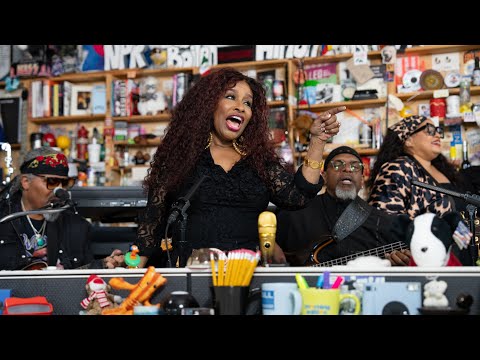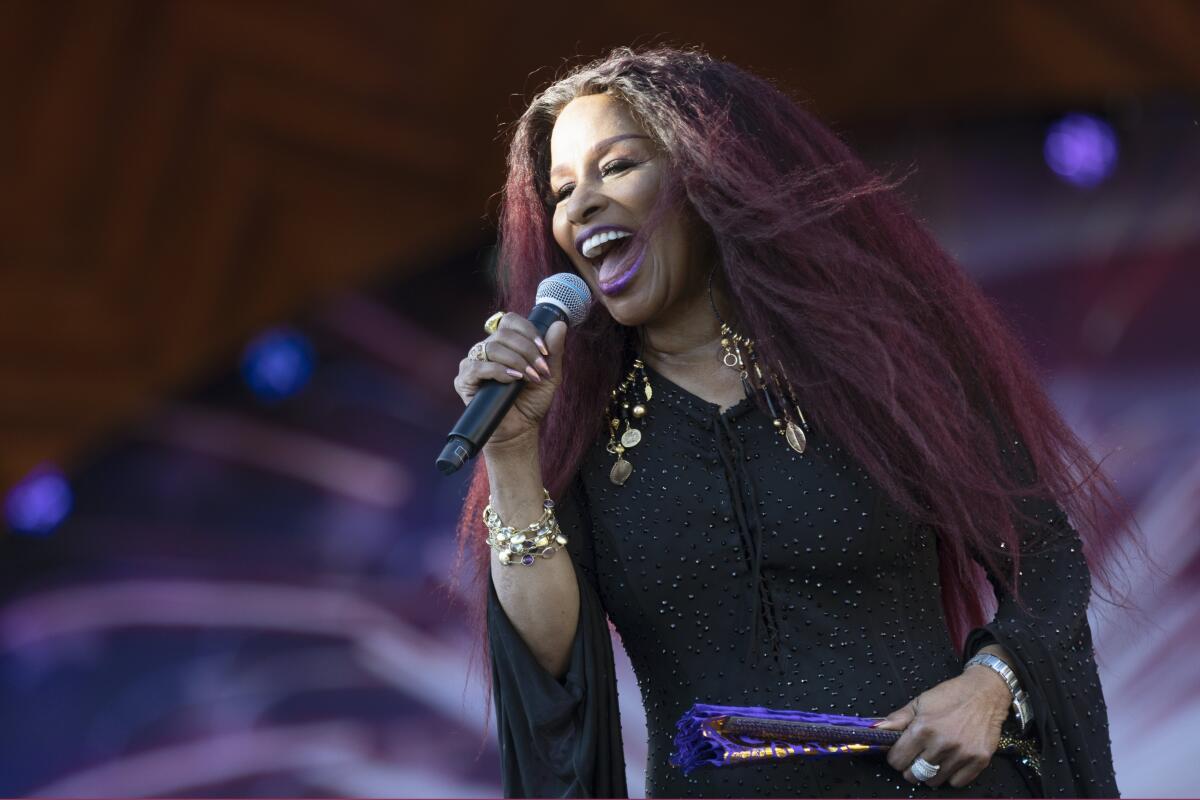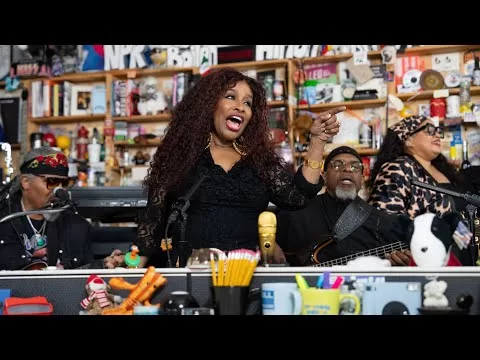It’s never a bad time to be influenced by Chaka Khan, but this feels like an exceptionally great moment to call back to her. Records like Beyoncé’s disco/house masterpiece “Renaissance” and Sabrina Carpenter’s zippy “Espresso” all have DNA from the 71-year-old Khan, whose career includes leading the ‘70s funk group Rufus and a generation-spanning solo career in rock, R&B, soul and jazz. Her recent Tiny Desk show was a jubilant hit.
Khan has two shows in L.A. in the near future: Friday’s headline set at the Hollywood Bowl with the Hollywood Bowl Orchestra, and a high slot at the classic soul and R&B fest Fool In Love on Aug. 31. We talk about ridiculous men in the music industry, her friendships with the late Prince and Whitney Houston, and what it takes for Black women in music to ask for help and get it.

People really loved that Tiny Desk performance. It must be meaningful to see new generations discovering this music and holding it close.
They pretty much woke me up to come and sing! We had a good time, and it’s a beautiful thing. A lot of young people were born and raised on me. I’m already a staple.
You were inducted into the Rock and Roll Hall of Fame last year — belated congratulations. Jann Wenner from Rolling Stone and the Rock Hall had some pretty ridiculous things to say about how women in rock were not “articulate enough on this intellectual level.” Did you hear about that at the time?
I did not. Did he really say that? Wow.
Did you encounter that sentiment from men throughout your career?
I’ve never heard anybody say that women were not geniuses at music. I think women excel in the arts, period. I don’t read a lot of that crap that people say. I found it’s so much easier to just do what you do, do it the best you can and help and give to those who are interested and who want to be something great.
“I’m Every Woman” has been so deeply embedded in pop culture for so long. Are there times when the culture turns misogynist and that song resonates differently?
The song says “I’m Every Woman,” but you know, on any given audience on any given night, everybody’s singing it. So it’s an empowerment song. That’s what’s important. When I got the song, I thought “this is really powerful,” but for a while, I felt uneasy and out of place, because I took it personally. Like “I, Chaka Khan, am every woman?” But we are collectively every woman. We’re all human beings, we all have some male and we all have some female in us.
So many pop artists are indebted to you. There’s obviously influence in Beyoncé’s “Renaissance,” and Sabrina Carpenter’s “Espresso” was recently a hit and calls back to your late ’70s, early ’80s funk. Why is that era still so compelling today?
I think the ’90s music was pretty hot, too [laughs]. The thing is that good music never dies. Anything that’s beautiful, honest and true never dies. That is what is happening here. It has very little to do with the type of music that was being put out at any given time. As long as the music is quality, I’m glad to have made an impression.
You’ve never stopped making records, and you just did a really fun song with Sia and you’re in studio now with her now. What’s your musical relationship like?
Sia is like my goddaughter. We are so like minded and like in spirit, I wonder where she’s been all my life. I wish I could have known her sooner. Everything she writes, it’s very intuitive and she understands me. When I asked her “How do you know that about me?” she said to me, “Well, I grew up on you.”
When you write songs today, has your perspective or singing evolved with age in ways that you find interesting?
Oh yeah, because it’s changed. People have changed, stuff has changed. And so where we are as singers and musicians, songwriters and poets, art speaks to what is going on presently in this world. We are profoundly affected for the most part. Now, my music’s more introspective. Some of the songs are about making things happen and having self-esteem and enough pride and gumption to go for it.
You have a Hollywood Bowl show coming up. Do you have any fond memories of playing there?
I love it! It’s a great venue, great sound and it’s so beautiful. There’s nature all around you, and when you get a full moon out there on the night you play the Hollywood Bowl, there’s nothing more beautiful.
Later this year, you’re playing the Fool in Love fest with some absolute legends, is it meaningful to you that promoters are still building new festivals around those sounds and eras?
I grew up on a lot of that stuff, too. I have a wide variety of music that’s a part of my journey. That’s the music that I heard when the family got together, that I had to listen because I had no choice. But once I started buying my own records, I bought a lot of rock and roll, jazz and progressive stuff. Stevie Wonder and Sly Stone were was so special to me.
I wish Sly could be there on that bill; “Frisky” is one of my all-time favorite albums. We’re not in touch as often as I’d like to be with him, he’s never stayed in one place for too long. But we are connected in a very deep place. There are a lot of people that should have been on that gig, but didn’t make it.

Chaka Khan rehearses for the annual Fourth of July Boston Pops Fireworks Spectacular in 2022.
(Michael Dwyer / Associated Press)
Yeah, a lot of people you were close to or influenced, like Prince and Whitney Houston and Amy Winehouse, didn’t live to see this stage of their career. Is that a hard part of having such a long career, that you end up missing a lot of people?
My grandmother once told me that one day, there’s gonna be a day when the phone rings. And you’re going to know pretty much who it is. It will be one of probably two or three people. It gets tough if you live a long and rich life like she did. She says it gets lonelier and lonelier. My grandmother had a lot of family, but she had her moments when she really missed her friends. I really miss my friends. I really, really do. Whitney [Houston], I miss deeply. I miss Prince deeply. I miss Miles Davis.
You wrote in your memoir that during your early years in Rufus and your solo career, there was some pretty hard partying.
Everyone did back then!
It was the ’70s and ’80s, of course. You also went to rehab in 2016. Was it hard to make those changes at that stage of life?
That’s what it boils down to — you making those changes. Not the rehab. I give very little credit to the rehabilitation society who charge an arm and a leg and a heart. It really boils down to you at the end of the day. If it works for you, I’ve found, it has very little to do with sober living like the one I went to and spent so much money at.
White male rock stars go to rehab all the time, and it’s a badge of honor. Is it harder for Black women in music to seek support like that?
It’s hard for Black people in most industries to get their propers. I’m not just saying that, we all know that. You can see it every day. Yeah, it’s tough. But I don’t focus on that. It’s never stopped me from working and trying to attain and achieve. It does not put a dent in that at all.
Are there any deep cuts in your live shows today that you’re surprised young people know?
I’m not surprised at anything with young people. These kids really are on it. They know it a lot more than we give them credit for. I remember having to really search and do some legwork to find the music that I wanted to hear, but today everything is at your fingertips.
Before you go, I found your old episode of Celebrity Ghost Stories, it sounds like you had a very scary experience with the paranormal! Have you had anything like that happen again?
No, no, no. I learned how to deal with it and what to do. I stayed in so many hotel rooms, and you never know what happens in hotel rooms. People go to hotels to do the things they would not do at home. So I’ve learned how to cleanse my rooms when I go in. I’m never without my crucifix and my holy water, and my palo santo. I’m on it. I don’t have any problems anymore.
